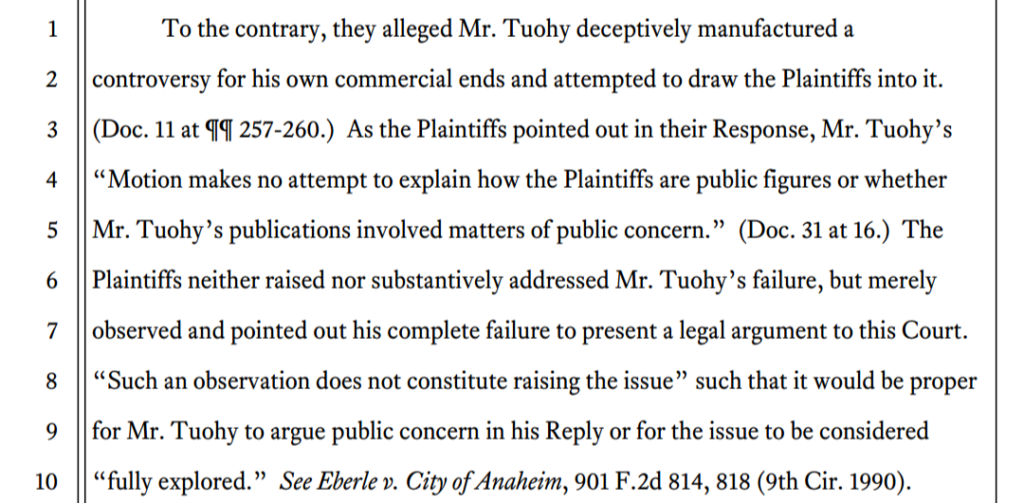Fireclean has filed a motion to strike (https://blog.vuurwapen.com/wp-content/uploads/2017/06/34-Motion-to-Strike.pdf) portions of my Reply in Support of the Motion to Dismiss (https://blog.vuurwapen.com/wp-content/uploads/2017/06/33-Reply-ISO-MTD.pdf) their latest lawsuit against me. Their motion is based on the claim that the Reply introduced concepts which were not introduced in the Motion to Dismiss, which they contend is unfair. To be clear, not introducing things in a motion and then introducing them in a reply is not okay under the Federal Rules of Civil Procedure, so if they had a solid basis for this motion then there would be a good chance it could be successful.
Now, I am not a lawyer, and what follows is not a legal argument but simply my interpretation of the issues at hand and the ridiculousness of their argument based on the information they have presented.
However, they do not have a solid basis for this motion. Most importantly, these issues were raised in the Motion to Dismiss. Which issues, you ask? The issues they claim were not properly raised are closely related: that their speech was a matter of public opinion and, as a result, that I was acting as a consumer advocate. In claiming this, they appear to have missed the following quotes from the Motion to Dismiss, the latter of which was in fact the concluding paragraph of the whole shebang:
“FireClean’s Complaint repeatedly (but summarily) alleges that Mr. Tuohy published all of the 21 different challenged statements with “actual malice”. In doing so,
FireClean appears to correctly concede the statements at issue involve matters of public interest or concern. As such, to state a valid claim, FireClean must plead facts sufficient to establish actual malice; “If a defamation action involves a matter of public concern, a plaintiff must establish the presence of actual malice.””
And…
“What FireClean may not do is unlawfully abuse the legal system in an effort to suppress and conceal honest, legitimate expressions of opinion; “[The Lanham Act] has never been applied to stifle criticism of the goods or services of another by one, such as a consumer advocate, who is not engaged in marketing or promoting a competitive product or service.” Goodman, 2014 WL 1310310, *5. The conclusion is precisely applicable here.”
Fireclean cites a case which they seem to imply supports their argument, selectively quoting snippets of sentences to seemingly imply that the issue needs to be raised in such a manner as to be considered “fully explored” in order to be allowed in a reply brief. Here’s their argument, which you should read in its entirety by following the link at the beginning of the article:
However, if we look at the complete sentences nearby in the case they cite (Eberle v. City of Anaheim) , we see that this case is not only inapplicable in the way Fireclean implies, but it actually supports including the arguments they wish to toss out (emphasis mine, and I’ve removed case citations for simplicity’s sake):
“Kiser did not raise the argument in his opening brief. Indeed, in his opening brief he neither mentions the pretrial order nor the district court’s denial of his motion to amend it. The first time the argument pops up is in Kiser’s reply brief… We could consider the issue had appellees raised it in their brief… But appellees merely noted that Kiser had failed to raise the issue. Such an observation does not constitute raising the issue. We could also “consider the issue [if] the appellee has not been misled and the issue has been fully explored.” This, however, is not the case. The issue has not been fully explored.”
The case they cite does not require an issue to be fully explored and indeed it clearly states that an issue can be considered if raised in the brief. The “observation” they refer to in the other case was an admission that the issue had in fact not been raised in that case. The concepts of consumer advocates and whether or not their speech was a matter of public opinion were indisputably “raised” in the Motion to Dismiss. Therefore, this motion to strike is another ill-advised and extraneous attempt to distract from their complete lack of a case, much like their earlier motion to prevent me from filing seven extra pages in response to their phone-book-sized lawsuit, which failed.


The real winners in all of this are FireClean’s lawyers. They must be booking a lot of hours with all these motions.
This is some bizarrely poor work by Fireclean’s firm. They seem to have no concern for their reputation for integrity in filing such nonsense.
As I said before, these guys should just give you the money they are pissing away on this. At least you would put it to good use.